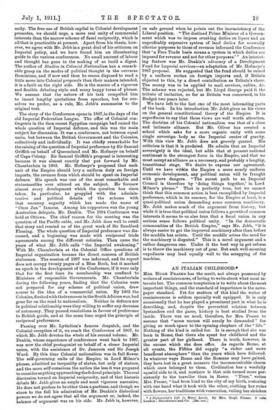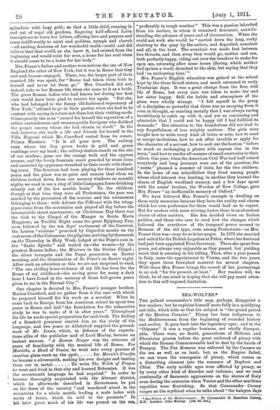AN ITALIAN CHILDHOOD.*
Mils. HUGH Fa&sxa has the merit, not always possessed by writers of reminiscences, of loving to write about what most in- terests her. The common temptation is to write about the most important things, and the standard of importance is the news- paper standard. Yet for matters of this kind the writer of reminiscences is seldom specially well equipped. It is only occasionally that he has played a prominent part in what he is describing, and, despite the proverbial relation between bystanders and the game, history is beat studied from the inside. There was no need, therefore, for Mrs. Fraser to assume that "some excuse will surely be demanded" for. giving so much space to the opening chapters of the " life." Nothing of the kind is called for. It is enough that she was born in Rome, that there she spent her childhood and the greater part of her girlhood. There is truth, however, in the excuse which she does offer. As regards Rome, at all events, the Fifties did supply "a richer and more beneficent atmosphere" than the years which have followed. In whatever ways Rome and the Romans may have gained, they have lost in a great measure the incommunicable charm which once belonged to them. Civilization has a woefully squalid side to it, and nowhere is that side turned more per- sistently to the traveller than in Rome. " Time,", writes Mrs. Fraser, " had been kind to the city of my birth, restoring with one hand what it took with the other, clothing her ruins with flowers, her traditions with veneration, veiling her stricken • A Dipiematiet's Life in Many Lands. By Mrs. Hugh Fraser. 2 vols. London ; Hutchinson and Co. [21e. net.]
splendour with hazy gold ; so that a little child, running in and out of regal old gardens, fingering half-effaced Latin inscriptions to learn her letters, offering love and prayers and roses indifferently to saint and goddess, nymph and cherub —all smiling denizens of her wonderful world—could and did believe that that world, as she knew it, had existed from the beginning and would exist for ever, a home for her soul when it should cease to be a home for her body."
Mrs. Fraser's father and mother were natives the one of New England the other of New York, but it was in Rome that they met and became engaged. There, too, the larger part of their married life was spent, for " Rome had taken them both to herself and never let them go." Mrs. Crawford did not, indeed, take to her Roman life when she came to it as a bride. The great Roman ladies who had known her during her first visit would have been glad to receive her again. " But she, who had belonged to the funny old-fashioned supremacy of New York," refused to go to their parties when she had to be content with seeing in return not them but their visiting cards. Consequently she soon " earned for herself the reputation of a rather cantankerous and unmanageable foreigner who disliked the people among whom she had chosen to dwell." In the end, however, she made a life and friends for herself in the 'Villa Negroni which Mr. Crawford rented from its owner, Prince Massimo. "It is all gone now. The railway runs where the ilex grove broke in gold and green rustlings over my head ; the railway station stands on the site of our studios ; gone are the orange walk and the cypress avenue, and the lovely fountain court guarded by stone lions and encircled by cypresses wreathed to their crests with climb- ing roses. The fountain had been playing for three hundred years, and the place was so quiet and remote that when we children looked down from our nursery windows on moonlit nights we used to see a ring of little Campagna foxes drinking silently out of the low marble basin." To the children, though at that time they were all Protestants, the year was marked by the procession of the seasons and the ceremonies belonging to them : with Advent the Pifferari with the irbag- pipes came from the mountains and played all day before the innumerable street sanctuaries ; on Christmas Day there was the visit to the Chapel of the Manger in Santa Maria Maggiore; on Twelfth Night came the great Epiphany Fair, soon followed by the ten days' excitement of the Carnival, the Lenten " stations " preached by Capuchin monks on the vast arena of the Colosseum, the pilgrims arriving by thousands on the Thursday in Holy Week, lodged at the Pope's cost in the " Santo Spirito " and waited on—the women—by the greatest Roman ladies; the Miserere in the Sistine Chapel ; the silver trumpets and the Papal procession on Easter morning, and the illumination of St. Peter's on Easter night. After such an education as this we are not surprised to read, " The one abiding home-sickness of my life has been for the Rome of my childhood—the saving grace for many a dark hour I have found in the memory of those full-grown years given to me in the Eternal City."
One chapter is devoted to Mrs. Fraser's younger brother, Marion Crawford, and we gather from it the care with which he prepared himself for his work as a novelist. When he came back to Europe from his American school he spent two years in Rome, and laid " the foundation for the exhaustive study he was to make of it in after years." Throughout his life he made special preparation for each book. The finding of a Sanskrit grammar started him on the study of the language, and two years at Allahabad supplied the ground- work of Mr. Isaacs, which, in defiance of the expecta- tions alike of the publisher and of Lord Morley, became an instant success. "A Roman Singer was the outcome of years of familiarity with the musical life of Rome. For Marietta, a Maid of Venice, he went into every • process of venetian glass-work on the spot; . . . . for Marzio's Crucifix he became a silversmith, making his own designs and beating
them out in metal To write The Witch of Prague he went and lived in that city and learned Bohemian. It was the seventeenth language he had acquired." In order to become thoroughly acquainted with the Abruzzi district,
' which he afterwards described in Saracinesca, he put on the dress-of the country "and wandered about in the mountains for a whole month, leading a mule laden with sacks of beans, which he sold to the peasants." In his later years much of his life was passed on the sea,
" preferably in rough weather." This was a passion inherited from his mother, in whom it remained dominant, notwith- standing the advance of years and of rheumatism. When she could not walk she would be "carried down the long, rocky stairway to the quay by the sailors, and deposited, armchair and all, in the boat. The armchair was made fast between two thwarts, and then away they would go, mother and son, both perfectly happy, riding out over the breakers to make for open sea, returning after some hours (during which neither had spoken a word) drenched to the skin, but saying that they had an enchanting time."
Mrs. Fraser's English education was gained at the school kept by the three Sewell sisters, and much esteemed in early Tractarian days. It was a great change from the free, wild life of Rome, but every care was taken to make her and her sister happy. Still the habits and atmosphere of the place were wholly strange. "I felt myself in the grasp of a discipline so powerful that there was no escaping from it even in thought, so exacting morally that I was always racing breathlessly to catch up with it, and yet so convincing and admirable that I could not be happy till I had fulfilled its demands." But attention to the foundations did not lead to any forgetfulness of less weighty matters. The girls were taught how to write every kind of letter or note, how to send or accept invitations, how to ask after invalids or apply for the character of a servant, how to seek out the hostess " before so much as exchanging a glance with anyone else in the room," and how to render all manner of small courtesies to then elders. One year, when the American Civil War had half ruined everybody and long journeys were out of the question, the " aunts " planned a summer of visits for the two children. In the home of one schoolfellow they lived among people whose chief interest was hunting, in another they learned the charm of English woodland scenery, and a few days spent with the aunts' brother, the Warden of New College, gave Mrs. Fraser " an ineffaceable memory of Oxford."
We have followed Mrs. Fraser's example in dwelling on these early memories because they have the reality and charm which her own preference for them would lead us to expect. But for readers with more stirring tastes there is an abundant choice of other matters. She has decided views on Italian politics, and those who care to read how the changes which followed the overthrow of the temporal power seemed to Romans of the old type, even among Protestants—as Mrs. Fraser then was—may do so in her pages. In 1873 she married and sailed for the British Legation at Pekin, where her husband had just been appointed First Secretary. There she spent four years, not always very enjoyable as they passed, but yielding much that is amusing in the telling. Then, after a year passed in Italy, came the appointment to Vienna, and the two years they spent there furnished material for several chapters. With these Mrs. Fraser brings the record of her journeyings to an end, "for the present, at least." Her readers will, we think, be of one mind in hoping that she will pay scant atten- tion to this self-imposed limitation.















































 Previous page
Previous page